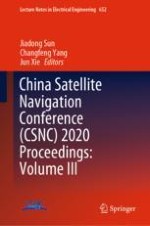2020 | OriginalPaper | Buchkapitel
Research on Receiving Method of Code Shift Keying (CSK) Signal
verfasst von : Yaohui Chen, Dun Wang, Siyuan Chen, Wencong Ma, Dongjun Li, Qijia Dong
Erschienen in: China Satellite Navigation Conference (CSNC) 2020 Proceedings: Volume III
Verlag: Springer Singapore
Aktivieren Sie unsere intelligente Suche, um passende Fachinhalte oder Patente zu finden.
Wählen Sie Textabschnitte aus um mit Künstlicher Intelligenz passenden Patente zu finden. powered by
Markieren Sie Textabschnitte, um KI-gestützt weitere passende Inhalte zu finden. powered by
